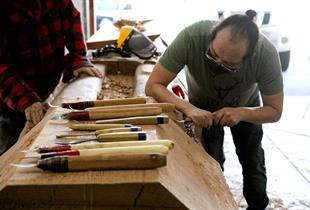House post to be a symbol of hope, healing and homecoming at the Red Fish Healing Centre

Gabriel, an artist and a carver from the Kwantlen First Nation, uses handmade tools to sculpt huge logs into tall house posts that tell stories about First Nations families and their relationship with the land. In some other communities, house posts are called totems.
Gabriel’s latest house post, commissioned by the kʷikʷəƛ̓əm (Kwikwetlem) First Nation, will soon make its home at the Red Fish Healing Centre for Mental Health and Addiction on səmiq̓ʷəʔelə, or the Place of the Great Blue Heron, also known as the Riverview Lands in Coquitlam.
The house post is both an intricate work of art and a testament to the rich history of the Kwikwetlem people, their ancestors, and the lands they have called their own for thousands of years.

As Gabriel moves along the house post, he surveys his tools, thoughtfully selecting one to carve out the eagle feathers partway down the post. His movements are quick and confident, but also reverent. The 600-year-old, 4,000-pound red cedar log, carefully chosen by Kwikwetlem First Nations Elders from Kwikwetlem Mountain, will tell a powerful story not only of overcoming adversity, but also of homecoming for the Kwikwetlem First Nation people, who will be sharing their land with the clients and patients at the Red Fish Healing Centre.
The opportunity for him to craft this particular house post is immensely meaningful for Gabriel, who has walked a journey similar to many of the clients who will spend time at the Red Fish Healing Centre when it opens in the fall.
“I know it because I have lived it,” Gabriel says, referring to his own healing journey with substance use. “I know what pain feels like.”
Several months ago, he and a group of Elders with the Kwikwetlem First Nation determined that the wood log would become a warrior. For some, the term “warrior” brings to mind images of a battle — but for Gabriel and his people, a warrior plays a far more complex role.
“When you take your pain and your trauma and use it to help others — that, to me, is what a warrior does,” he says. “You help people get back onto their feet, and then fight with dignity. A warrior has been through hell and is getting back up to fight, and in turn helping others fight and protect their community. It’s not about fighting others; it’s about overcoming the challenges inside of us.”
Early in 2021, Gabriel and the chief and council of the Kwikwetlem First Nation invited a group of leaders from BC Mental Health and Substance Use Services to participate in the carving of the house post. This invitation is a powerful symbol of both partnership and friendship.

The Kwikwetlem First Nation has also gifted house posts to other communities, including Port Moody’s Rocky Point Park. But the warrior that will stand proudly at the Red Fish Healing Centre is especially significant because it is the first on the Kwikwetlem First Nation’s primary land — a sign that they have come home.
“These are our ancestral grounds, and they are very sacred,” said Chief Ed Hall of the Kwikwetlem First Nation. “When we stand this house post up, 600 years of history will be reawakened — Riverview has always been a place of transformation, and we welcome the opportunity to walk alongside our partners at the Red Fish Healing Centre to help make this a place of healing once again.”
“It’s an incredible honour to receive this gift from the Kwikwetlem First Nation,” said Lynn Pelletier, the VP of BC Mental Health and Substance Use Services for the Provincial Health Services Authority. “The warrior will be a powerful symbol of strength, resilience, healing, and transformation, and it will play a role in many of our clients feeling welcome and safe here.”
Gabriel believes the warrior will be a guardian, but also a symbol of hope. “People have been fearful of healing houses. They used to go there because they were ‘bad.’ But today, a healing house is a community hub — a place to treat wellness like a part of day-to-day life.”

After hearing from Gabriel about the history of the land, his own journey to healing, and the significance of the warrior in the house post, many of the BC Mental Health and Substance Use Services leaders at the carving ceremony were given the opportunity to try their hands, albeit hesitantly, at shaving the wood on the sacred piece that will outlive us all.

“Helping to carve the house post was truly an honour,” said Kathryn Embacher, a senior director responsible for the Red Fish Healing Centre. “There is so much that goes into making a house post, and so much meaning it has that I had no idea of. I also benefitted from learning more about the Kwikwetlem First Nation people and the stewardship they have taken over the lands for many centuries.”
"We gained an appreciation of the healing traditions that have occurred here long before construction on the Red Fish Healing Centre began,” said Dr. Nickie Mathew, the site’s medical director. “It’s an honour to be invited to be part of continuing that tradition.”